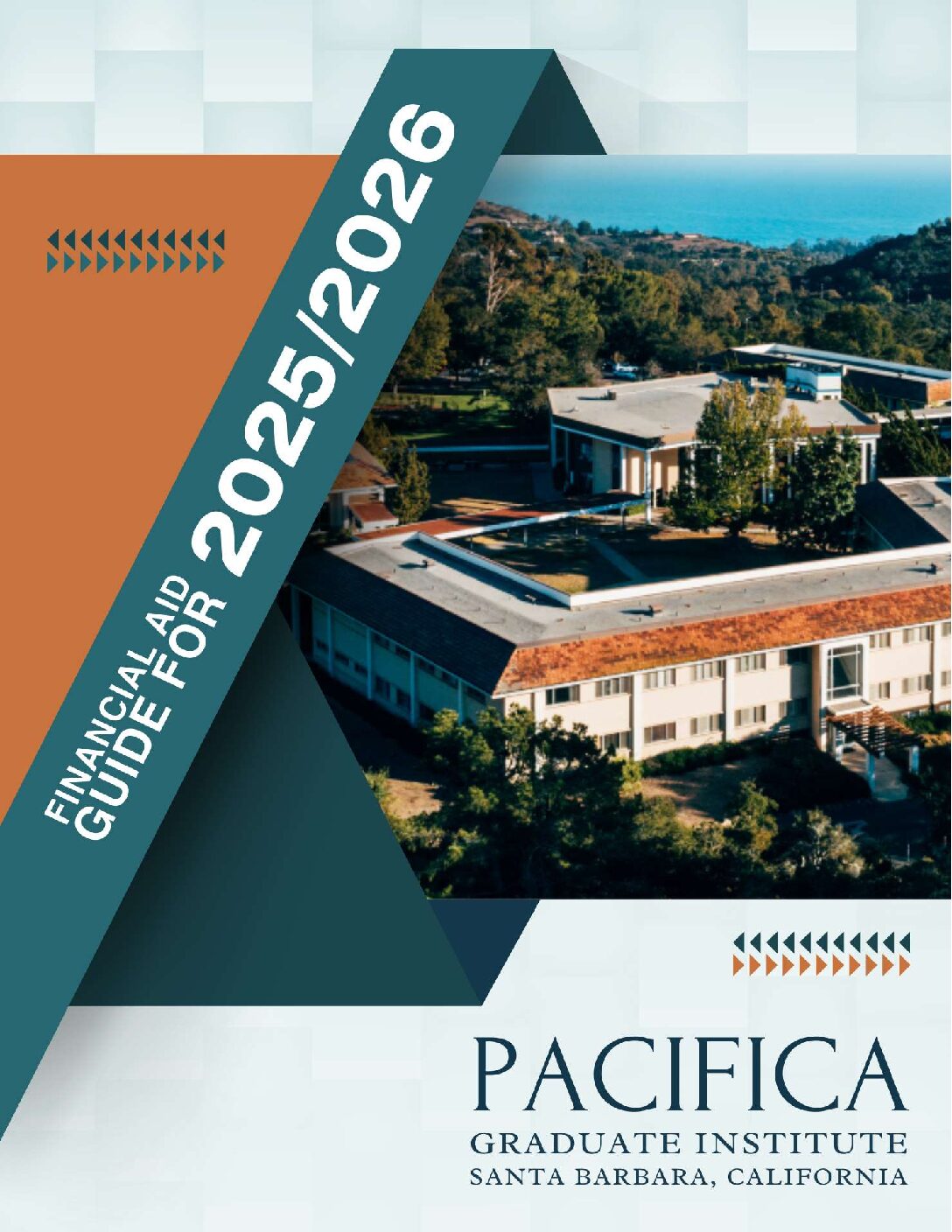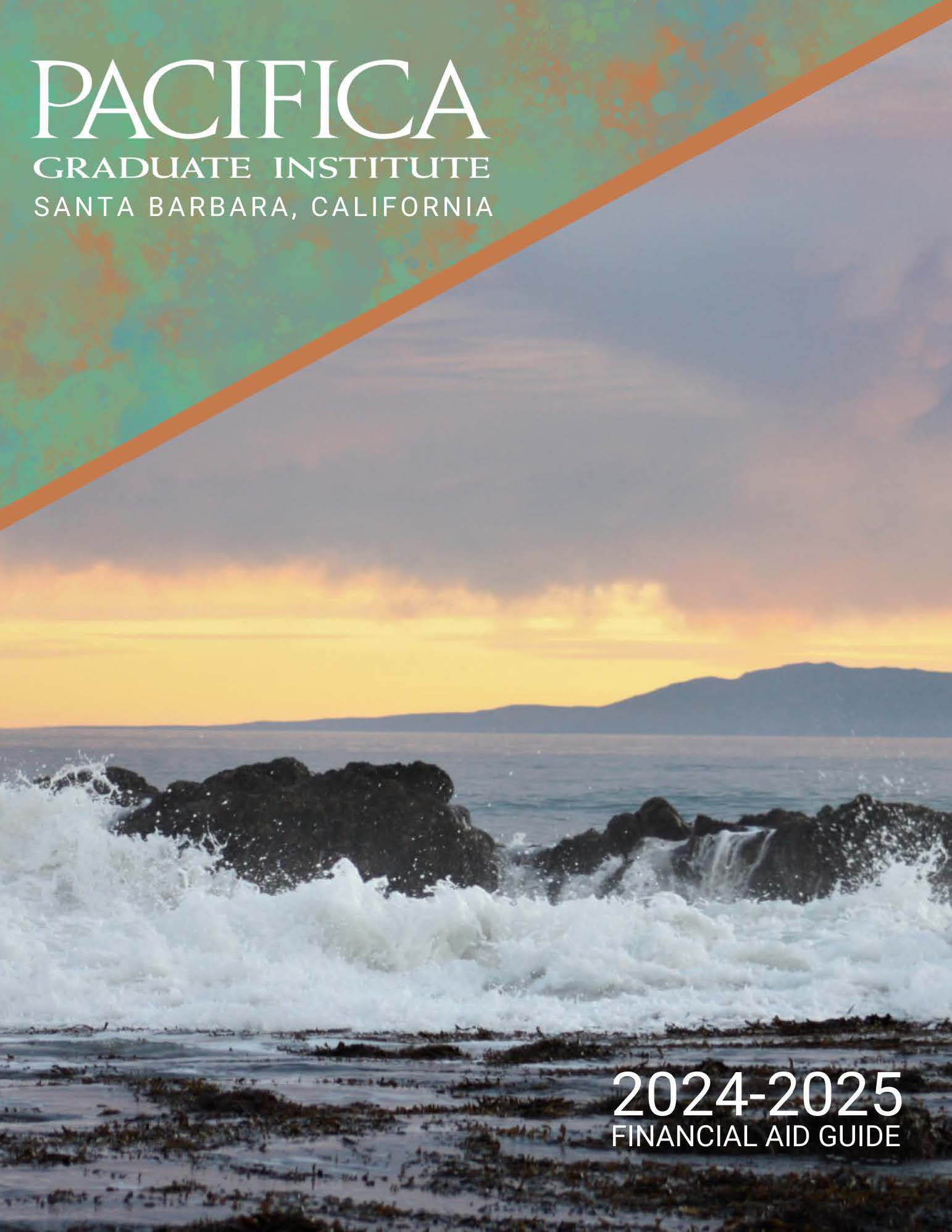Financial Aid
Financial Aid at Pacifica Graduate Institute
Welcome to Financial Aid at Pacifica
Pacifica Graduate Institute is a degree granting institution, accredited by the WASC Senior College and University Commission (WSCUC) and is approved by the US Department of Education for participation in the Federal Loan Programs. We would like to take this opportunity to extend our welcome to you. While the process of financing an education can be challenging, the Office of Financial Aid Office is committed to making this process as manageable as possible.The purpose of financial aid is to provide financial assistance to students enrolled in at least a half-time basis (minimum of three units/quarter) in an eligible program at Pacifica. Pacifica’s Board of Trustees, administrators, faculty and staff do all they can to ensure a quality educational experience.
Financial Aid Consultation
Schedule A Financial Aid Consultation
All applicants and newly accepted students are now able to schedule a one-on-one phone consultation with a member of our Office of Financial Aid .
View the estimated cost of attendance for each program.
Each program will reflect a cost breakdown with financial aid.
2025-2026 Financial Aid Guide
The financial aid information published in this handbook is current and accurate at the time of printing. Federal and state regulations governing the various federal and state programs may change periodically. Please consult the Financial Aid Office for the most current information.
2024-2025 Financial Aid Guide
The financial aid information published in this handbook is current and accurate at the time of printing. Federal and state regulations governing the various federal and state programs may change periodically. Please consult the Financial Aid Office for the most current information.
2023-2024 Financial Aid Guide
The financial aid information published in this handbook is current and accurate at the time of printing. Federal and state regulations governing the various federal and state programs may change periodically. Please consult the Financial Aid Office for the most current information.
Student Consumer Information
All postsecondary institutions participating in federal financial aid programs are required to make available certain information to assist consumers in making more informed decisions about their education options. Visit our Student Consumer Information page to review our disclosures.
General Eligibility Criteria How do I qualify?
The Federal Direct Stafford Loan program is an entitlement program and is not based on your income or assets. To qualify you must:
- Be admitted and enrolled in at least a half-time basis in an eligible program at Pacifica.
- Complete the FAFSA each year to determine eligibility for federal financial assistance. Use Pacifica’s School Code: G31268
- Must be in good standing in order to qualify for federal financial assistance. Student may not be in default on or owe a refund for any federal financial aid programs or federal liens.
- Must be a U.S. citizen or legal permanent resident of the United States.
- Provide proof of compliance with selective service registration and drug conviction regulations.
- Must be making Financial Aid Satisfactory Academic Progress (FSAP) toward the completion of the degree requirements.
Financial Aid Process How do I apply? ~ How does this work?
For helpful information regarding the Financial Aid Process, please download the Financial Aid Process Flow Chart.
- Step one: Complete the FAFSA (Free Application for Federal Student Aid) on an annual basis at FAFSA on-line. Please remember to include Pacifica’s School code – G31268.
- Step two: Once the FAFSA results are received, Pacifica will determine your eligibility and email you an Award Notification with instructions on how to complete the financial aid process.
- Step three: You will have access to review the award and actively confirm your interest (accept or decline) the Award on Pacifica’s Financial Aid Online System. If you accept the Award, you must also complete an online Master Promissory Note and Entrance Counseling requirements through the U.S Department of Education website at https://studentaid.gov/.
Cost of Attendance
Cost of Attendance (COA) is a budget determined by the institution to estimate the cost of education for the academic year. This includes direct costs, such as tuition and residential/nonresidential fees, plus estimates of indirect costs, including living expenses (outside of Pacifica), books, travel, personal, and miscellaneous expenses. The estimated figures of the indirect costs are provided by The College Board and are based on nine-month California regional and metropolitan budgets developed by the Bureau of Labor Statistics. These indirect costs are only estimates. Individual student costs may vary based on student’s standard of living and residential location. A breakdown of the COA is available here.
Deadlines
- Students may apply for the Federal Direct Unsubsidized Stafford Loan year-round by completing the FAFSA on-line but plan ahead to make sure that you complete the required items by the start of the quarter. All items should be accurately completed and received by the Financial Aid Office at least 3 weeks prior to your tuition due date. Although loans will be originated throughout the academic year, students who do not submit the required items in a timely manner must be prepared to meet their tuition obligation.
Pacifica Scholarships
- Pacifica is pleased to provide institutional scholarship opportunities. Please visit the Pacifica Scholarship Programs webpage for more information.
NASFAA Code of Conduct for Institutional Financial Aid Professionals
An institutional financial aid professional is expected to always maintain exemplary standards of professional conduct in all aspects of carrying out his or her responsibilities, specifically including all dealings with any entities involved in any manner in student financial aid, regardless of whether such entities are involved in a government sponsored, subsidized, or regulated activity.
In doing so, a financial aid professional should:
- Refrain from taking any action for personal benefit.
- Refrain from taking any action believed is contrary to law, regulation, or the best interests of the students and parents served.
- Ensure that the information provided is accurate, unbiased, and does not reflect any preference arising from actual or potential personal gain.
- Be objective in making decisions and advising their institution regarding relationships with any entity involved in any aspect of student financial aid.
- Refrain from soliciting or accepting anything of other than nominal value from any entity (other than an institution of higher education or a governmental entity such as the U.S. Department of Education) involved in the making, holding, consolidating or processing of any student loans, including anything of value (including reimbursement of expenses) for serving on an advisory body or as part of a training activity of or sponsored by any such entity.
- Disclose to the institution, in such manner as the institution may prescribe, any involvement with or interest in any entity involved in any aspect of student financial aid.
For more information please see NASFAA’s Statement of Ethical Principles and Code of Conduct for Financial Aid Professionals.
The Financial Aid available to Pacifica students is determined by applicable government regulations. The financial agreement between Pacifica and its students is stated in signed Tuition and Fee Enrollment Agreements. The Pacifica Graduate Institute Course Catalog is the authoritative source of information concerning the Institute. If there are any questions about the description of Financial Aid at this web site, or discrepancies between this information and that stated elsewhere, the information contained in the government regulations, the Tuition and Fee Enrollment Agreement, the Pacifica Catalog and the Pacifica Guide to Financial Aid brochure take precedence. A Catalog or other information regarding Pacifica’s programs may be obtained by contacting financialaid@pacifica.edu or applicant@pacifica.edu
Contact Office of Financial Aid
Office of Financial Aid
249 Lambert Road
Carpinteria, CA 93013
OFFICE HOURS: Monday–Friday, 8:00am–4:00pm
PHONE: 805.679.6197 | FAX: 805.565.9887 | EMAIL: financialaid@pacifica.edu
Director of Financial Aid
Tracie Teague
(805) 679-6137
tteague@pacifica.edu
- Enrollment Agreements
- Peace Corps – Paul Coverdell Fellows Benefits
- Financial Aid Suspension Appeal Review
- Administrative Policies –ED, BPPE State Authorization
- Compliance
Associate Director of Financial Aid
Theresa Quijano
(805) 679-6150
tquijano@pacifica.edu
- Financial Aid Publications
- Dissertation Students
- Satisfactory Academic Progress Review for Dissertation Students
- Loan Adjustments
- Scholarships
Lead Financial Aid Coordinator
Sabrina Wilson
(805) 679-6159
swilson@pacifica.edu
- General Financial Aid
- Loan Disbursements
- Veteran’s Benefits / Vocational Rehabilitation Benefits
Financial Aid Coordinator
Vickie O’Neal
(805) 679-6197
voneal@pacifica.edu
- General Financial Aid
- New Students
- Video/Phone Consultations
- Satisfactory Academic Progress Review
- Repayment Counseling
- Tribal Benefits
- AmeriCorps Benefits
Non-discrimination Policy:
Pacifica is committed to a policy of non-discrimination and does not discriminate on the basis of race, color, national origin, religion, creed, gender, sexual orientation, or identity, physical or mental disability, citizenship status (within the limits imposed by law or Institute policy), marital status, medical condition, or age in any of its policies, procedures or practices.





